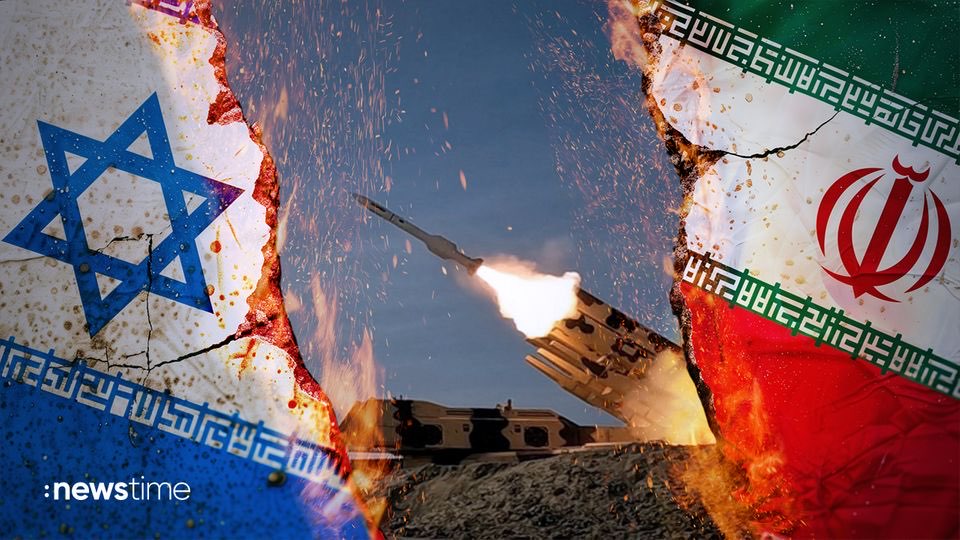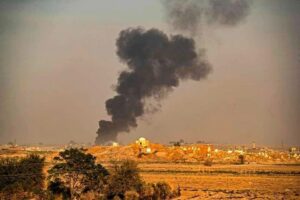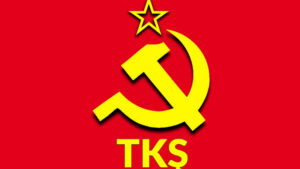On 13 April, Iran carried out its previously announced revenge attack on Israel.
This was preceded by a deadly Israeli airstrike on the Iranian consulate in Syria on 1 April.
All eyes around the world are on the Middle East: Is this the beginning of World War 3? Are there no alternatives?
What are both states fighting for?
Within seconds of the attack on Israel, the German media realised: the barbaric Iranian state was attacking the only democracy in the Middle East.
No mention was made, for example, of Israel’s previous attack on the Iranian consulate in Syria.
Almost all imperialist western states especially the USA, Germany, France and the United Kingdom released statements for Israel and threatened Iran.
Iran carried out its attack in cooperation with the Yemeni Houthis and Hezbollah from Lebanon. It must also be assumed that the imperialist Russian state, Iran’s close ally, knew about this attack.
Israel
The Israeli state is based on the ideology of Zionism.
Zionism was initially a religious dream of various European Jews to emigrate back to Israel. With the rise of European nationalism and by the end of the 19th century, this religious idea was expanded and politicised – gaining its political programme.
From the very beginning, Zionism was designed to expel the Palestinians and deny them all their rights; it has a colonialist character.
The founding father of modern Zionism, Theodor Herzl, tried to make his ideology suitable to the major Western powers – first the German Empire, then the United Kingdom. Since its birth, Zionism has been the extended arm of Western imperialism.
When Israel attacks Iran, it must be recognised that it is doing so because its (and therefore also Western imperialism’s) hegemonic claims are in danger. Just now, when the USA has shifted its focus to the Indo-Pacific Ocean in order to devote itself to its greatest adversary, the People’s Republic of China, the competitive battles in the Middle East are taking on an open form.
Israel is trying to underline its claim to hegemony by attacking Iran.
Iran is also seizing the opportunity to attack Israel directly. Israel has not been in such a bad and isolated position for a long time as it is now.
Iran
Iran has been a Shia Muslim theocracy since the Islamic revolution in 1979. In other words, a state that bases its legitimacy on religion.
As a theocracy, Iran is far behind bourgeois parliamentarism when it comes to democratic issues.
Ali Khamenei has been at the head of this state since 1989 and rules the country with an iron fist. Legally unrecognised trade unions, strikes or executions of Kurds and other political opponents of the system are not uncommon.
Despite many Western sanctions, the country can use its many natural resources to keep its head above water.
Iran is pursuing the geostrategy of being a hegemonic power in the region.
Iran competes with various states such as Turkey and Saudi Arabia on the one hand and Israel on the other.
Due to internal Muslim competition with many Sunni states, Iran has fewer Middle Eastern states to choose from with which it can build relations.
After the collapse of the Soviet Union and the resulting redivision of the world market, Iran’s search for strategic partners from the former Soviet Union intensified.
Iran found this strategic partner in Russia, a country that is also isolated from the West.
As part of the Shanghai Cooperation Organisation (a political and economic alliance
alliance around China and Russia), Iran is also a partner of Chinese imperialism.
Jin, Jiyan, Azadî
Following the murder of Kurdish woman Jina Amini by the morality police in 2023, there was a major uprising in the country. In many other countries around the world, women showed solidarity with the resistance in Iran. Many women cut off their hair in protest.
Thousands and thousands of people (especially women) took to the streets and fought against the religious-patriarchal system. The Kurdish slogan Jin, Jiyan, Azadî (woman, life, freedom) permeated all national borders.
A revolutionary situation arose in Rojhilat and in Iran, but the lack of a political leadership to channel these forces meant that the long uprisings levelled off again after battles and hundreds of executions took place.
Arbitrarily drawn borders through the Middle East
Everything changed in the Middle East in the course of the First World War with the Sykes-Picot Agreement (1916) between the United Kingdom and France.
When it became clear that the Ottoman Empire would not survive the world war, France and the United States divided up the Ottoman Empire among themselves.
Later, the artificial drawing of borders in the region materialised with the Treaty of Sèvres (1920) and finally with the Treaty of Lausanne (1923).
The European superpowers drew imaginery borders and decided over the heads of many ethnic and religious groups.
The consequence: decades of subjugation of many peoples and ethnic groups.
For example, after the collapse of the Ottoman Empire, the Kurds went without a nation state of their own.
In all four countries where they mainly live – Turkey, Iraq, Iran and Syria – they have been massacred, denied, assimilated and forcibly resettled for over a century.
The real democracy of the Middle East
Why this historical digression?
This brief reference to the First World War and the division of the Middle East is important because Kurdistan, which was colonised by four states, today holds the potential to change the entire Middle East without a nation state of its own.
When the imperialists brazenly claim today that Israel is the only democracy in the region, this is not only factually incorrect, but also serves to deny the real reason for the wars: profit interests.
Israel, which has over 60 official laws that degrade Palestinians to second-class citizens, will by no means be a democratic state.
We see this as something indisputable.
With the exception of a few states, this is also the prevailing opinion worldwide.
The Arab Spring brought about several regime changes through large mass protests, but failed to bring about a revolution that would replace the existing system with another.
In 2012, the colonised Kurds in the areas of northern Syria fought for their political independence. They fought the so-called Islamic State (ISIS) and began to realise something extraordinary in their territories – namely the establishment of a grassroots democratic system.
After other areas gradually became part of the autonomous self-government, and it was no longer a primarily Kurdish project, the revolution had to adapt to the circumstances and produce a system that included all ethnic and religious groups equally in the system.
For the Middle East, where there are many areas with unresolved national issues, this is both a turning point and a glimmer of hope.
On the one hand, we have the Autonomous Self-Government of North and East Syria, which consists of a council system in which all people can organise their lives regardless of their ethnic or religious affiliation, from the municipality to district councils and regional councils. On the other hand, there are still civil society organisations such as TEV-DEM, which serve to organise the masses in trade unions and inform them about their rights and demand accountability from the Autonomous Administration if work is not done properly at one level.
All council levels and organisations have equal representation, meaning that at least one woman holds the co-chair positions. Women have extra women’s councils and women’s courts in which only they can make decisions in patriarchal proceedings.
If one seriously wants to talk about a “democracy of the Middle East”, then the Autonomous Administration of North & East Syria is an example of democracy and not the Israeli state.
Resistance means life
Self-government is in danger in many aspects.
The USA and Russia, two major powers, are still in northern and eastern Syria. Even if their main focus is on the Ukraine-Russia and US-China conflicts, they will not voluntarily withdraw from the region.
The self-administration is therefore in danger of becoming the theatre of open and covert fighting between the two countries.
Turkish colonialism is also interested in liquidating the revolution.
To this end, it has already carried out over 90 drone attacks this year.
The European states, from which a total of more than 4,000 people have joined ISIS, are refusing to carry out the necessary legal processes – be it to bring the Islamists to justice in their own countries or to help the self-government in its bid to establish an international ISIS tribunal.
Turkey and Iraq have agreed on a deal that allows a 30-40 km deep “buffer zone” for Turkey in southern Kurdistan. The aim is to deprive the guerrillas of their place of retreat, the Medya defence areas.
Iraq has declared the PKK a banned organisation without parliamentary approval.
After the siege of South Kurdistan, Turkey will turn its attention back to the revolution and try to crush it next.
Both the Newroz festival in northern Kurdistan and the electoral successes in the local elections with the subsequent uprising in Wan, as well as the willingness of the people of northern and eastern Syria to stand unwaveringly behind the revolution, show that the resistance of the Kurdish people cannot be broken.
Let’s defend the revolution
The Autonomous Administration shows us and the peoples of the entire Middle East the possibility of the brotherhood of peoples and the women’s revolution.
For the first time since the new social contract of North and East Syria, there is a constitution in which Kurds, Arabs, Armenians, Assyrians, Circassians, Chechens and religious identities such as Muslims, Christians, Jews and Yezidis have equal rights.
But the survival of self-government is not only important for the peoples of the Middle East, it is also important for us in Europe.
The self-administration has won the solidarity of many people around the world with its heroic fight against ISIS. Many progressive and solidary people were drawn to the area to fight for the popular revolution.
Honouring those who have fallen in struggle means defending the revolution by all means.
It is important to connect the global struggles with each other, and the Autonomous Self-Government of North and East Syria could become the pilot project for the Middle East and convince the surrounding peoples of the anachronism of the monist-capitalist state.
Only together can we make a difference.
Congo, Yemen, Kurdistan, Artsakh, Ukraine, Palestine: let´s organise, strengthen solidarity between peoples and create a world worth living in.



